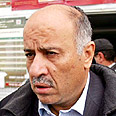
Jibril Rajoub, a Fatah Central Committee member who recently visited Lebanon, said in an interview with the Hezbollah affiliated television network Al Mayadeen, "We the Palestinians are the enemies of Israel."
In the interview, which took place earlier this month, Rajoub emphasized that Fatah now supports popular resistance, but has not abandoned the idea of armed resistance. "As the people of the Fatah movement, we keep resistance on the agenda in all its forms," he said.
Related stories:
- Assad's Facebook page attacks Israeli who aids refugees
- Op-ed: Fear of bigotry, not Islam
-
Islamic cleric in Gaza, rejects Israel's existence
"At present, we are satisfied by the popular resistance," Rajoub added, but explained, "We the Palestinians are a source of concern for Israel. We are in this country, and this country is ours. They are our enemy and our battle is against them."
The interviewer of Al Mayadeen, a network associated with Iran and with the Assad regime in Syria, criticized the policy of the Palestinian Authority, and in response Rajoub responded, "Our war is against the Israeli occupation. Our main enemy, not just as Palestinians, but Arabs and Muslims, is Israel and the Israeli occupation," he added.
At the height of the interview, when the subject of American efforts to revive the peace process between Israel and the Palestinians were raised, the interviewer asked: "Will you resume the negotiation game?"
Rajoub, who appeared agitated at the mocking tone, replied quickly that there would not be a return to negotiations without international decisions taken within a limited time frame and with the Israeli promise to freeze all “one-sided” steps related to Jerusalem, the separation barrier, settlements and the release of prisoners.
"Until now we have not had nuclear weapons," he declared, "but in the name of Allah, if we had nuclear weapons, we’d be using them."
Rajoub, one of several Palestinian leaders who signed the Geneva Initiative, had stated on previous occasions that he was interested in peace with Israel.
During his visit to Lebanon, he met with the Iranian ambassador to Beirut, Ghazanfar Roknabadi, and they discussed the subject of Israel's actions against the holy places of Islam and Christianity, as well as reconciliation efforts with Hamas.
- Receive Ynetnews updates
directly to your desktop















